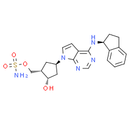Description
MLN 4924 (Tak 924) is a potent and selective NEDD8 activating enzyme (NAE) inhibitor (IC50 = 4.7 nM). MLN 4924 exhibits selectivity over closely related enzymes UAE, UBA6, SAE, and ATG7 (IC50 = 1.5, 1.8, 8.2, and >10 μM, respectively), and displays minimal activity at adenosine receptors and a panel of 12 cellular kinases. MLN 4924 exhibits cyotoxicity in several human tumor-derived cell lines and causes liver damage in SD rats, when given with TNF-α. It blocks the NEDD8 pathway causing DNA damage in mice bearing HCT-116 xenografts. Cell permeable.
Product information
CAS Number: 905579-51-3
Molecular Weight: 443.52
Formula: C21H25N5O4S
Synonym:
TAK-924
TAK 924
TAK924
MLN4924
BAY-73-4506
BAY 73-4506
BAY73-4506
Pevonedistat
Related CAS Number:
1160295-21-5 (Pevonedistat HCl)
Chemical Name: ((1S,2S,4R)-4-(4-(((S)-2,3-dihydro-1H-inden-1-yl)amino)-7H-pyrrolo[2,3-d]pyrimidin-7-yl)-2-hydroxycyclopentyl)methyl sulfamate
Smiles: NS(=O)(=O)OC[C@@H]1C[C@H](C[C@@H]1O)N1C=CC2C1=NC=NC=2N[C@H]1CCC2=CC=CC=C21
InChiKey: MPUQHZXIXSTTDU-QXGSTGNESA-N
InChi: InChI=1S/C21H25N5O4S/c22-31(28,29)30-11-14-9-15(10-19(14)27)26-8-7-17-20(23-12-24-21(17)26)25-18-6-5-13-3-1-2-4-16(13)18/h1-4,7-8,12,14-15,18-19,27H,5-6,9-11H2,(H2,22,28,29)(H,23,24,25)/t14-,15+,18-,19-/m0/s1
Technical Data
Appearance: Solid Power
Purity: ≥98% (or refer to the Certificate of Analysis)
Solubility: DMSO: 88 mg/mL(198.41 mM).
Shipping Condition: Shipped under ambient temperature as non-hazardous chemical or refer to Certificate of Analysis
Storage Condition: Dry, dark and -20 oC for 1 year or refer to the Certificate of Analysis.
Shelf Life: ≥12 months if stored properly.
Stock Solution Storage: 0 - 4 oC for 1 month or refer to the Certificate of Analysis.
Drug Formulation: To be determined
HS Tariff Code: 382200
How to use
In Vitro:
MLN4924 is structurally related to adenosine 59-monophosphate (AMP)—a tight binding product of the NAE reaction. MLN4924 (3 μM) selectively inhibits NAE in HCT-116 cell lysates. MLN4924 (3 μM) inhibits overall protein turnover by <9% in HCT-116 cells. MLN4924 results in a dose-dependent decrease of Ubc12–NEDD8 thioester and NEDD8–cullin conjugates with an IC50 < 0.1 μM in HCT-116 cells, resulting in a reciprocal increase in the abundance of the known CRL substrates CDT1, p27 and NRF2, but not non-CRL substrates. MLN4924 (3 μM) leads cells to accumulate in S-phase as early as 8 hours and results in a significant fraction of cells contained 4N DNA content by 24 hours in HCT-116 cells. MLN4924 (3 μM) results in rapid accumulation of pIkappaBalpha, decrease in nuclear p65 content, reduction of nuclear factor-kappaB (NF-kappaB) transcriptional activity, and G(1) arrest, ultimately resulting in apoptosis induction, events consistent with potent NF-kappaB pathway inhibition in ABC DLBCL cells. MLN4924 (1 μM) triggers DNA replication and inhibit cell proliferation by stabilizing the DNA replication factor Cdt1, a substrate of cullins 1 and 4. MLN4924 (1 μM) , which is sufficient to elevate Cdt1 for 4-5 hours, is found to be sufficient to induce DNA replication and to activate apoptosis and senescence pathways. MLN4924 treatment induces the characteristics of senescence phenotypes as evidenced by enlarged and flattened cellular morphology and positive staining of senescence-associated β-Gal. MLN4924-induced senescence is associated with cellular response to DNA damage, triggered by accumulation of DNA-licensing proteins CDT1 and ORC1, as a result of inactivation of CRL/SCF E3s. MLN4924-induced senescence is irreversible and coupled with persistent accumulation of p21 and sustained activation of DNA damage response.
In Vivo:
MLN4924 (60 mg/kg) results in a dose- and time-dependent decrease of NEDD8–cullin levels as early as 30 min after administration in HCT-116 tumour-bearing mice, with maximal effect 1–2 hours post-dose. MLN4924 (60 mg/kg) also leads to a dose- and time-dependent increase in the steady state levels of NRF2 and CDT1 in HCT-116 tumour-bearing mice. MLN4924 (60 mg/kg) leads to DNA damage in the tumour indicated by the increased levels of phosphorylated CHK1 in HCT-116 tumour-bearing mice. MLN4924 administered on a BID schedule at 30 mg/kg and 60 mg/kg inhibits tumour growth with T/C values of 0.36 and 0.15, respectively, in mice bearing HCT-116 xenografts. MLN4924 (60 mg/kg) blocks NAE pathway biomarkers and results in complete tumor growth inhibition in mice bearing human xenograft tumors of ABC- and GCB-DLBCL. MLN4924 (60 mg/kg) results in NF-kappaB pathway inhibition accompanied by tumor regressions in primary human tumor mice models of ABC-DLBCL.
References:
- Lin JJ, et al. Cancer Res, 2010 , 70(24), 10310-10320.
- Milhollen MA, et al. Blood, 2010, 116(9), 1515-1523.
- Soucy TA, et al. Nature, 2009, 458(7239), 732-736.
Products are for research use only. Not for human use.
Payment & Security
Your payment information is processed securely. We do not store credit card details nor have access to your credit card information.


